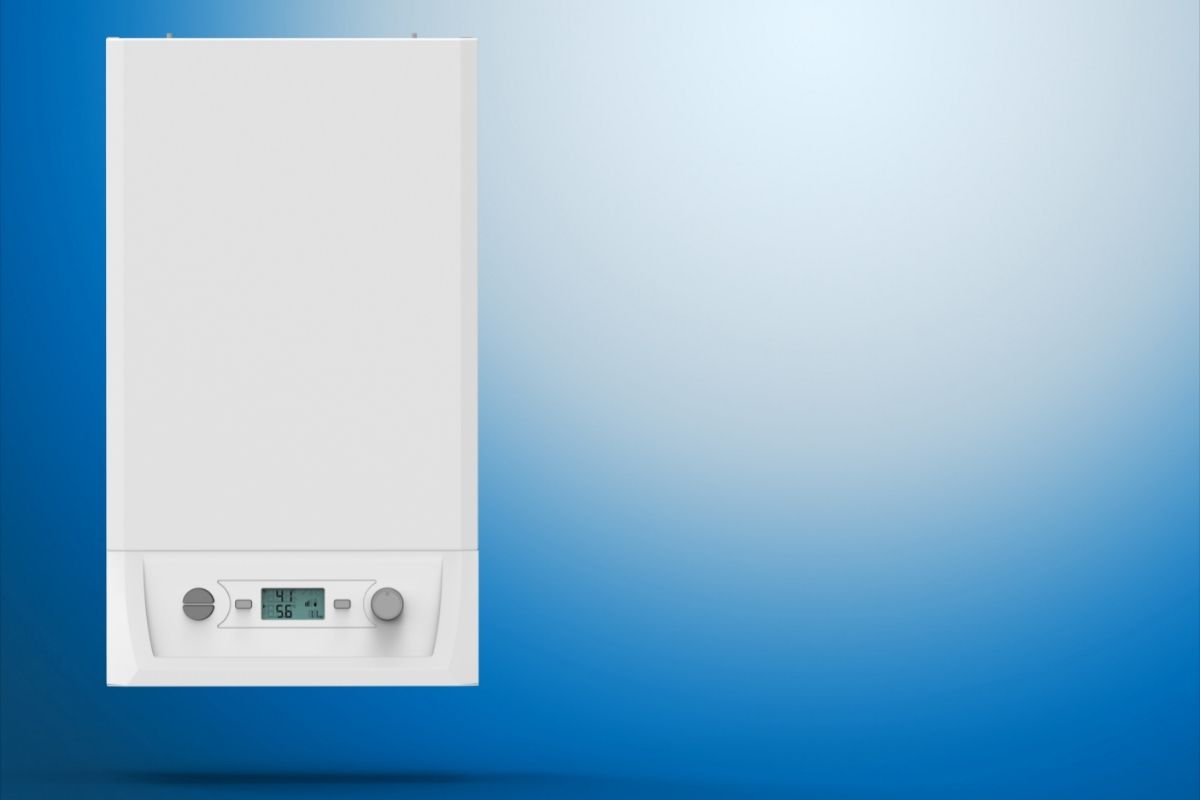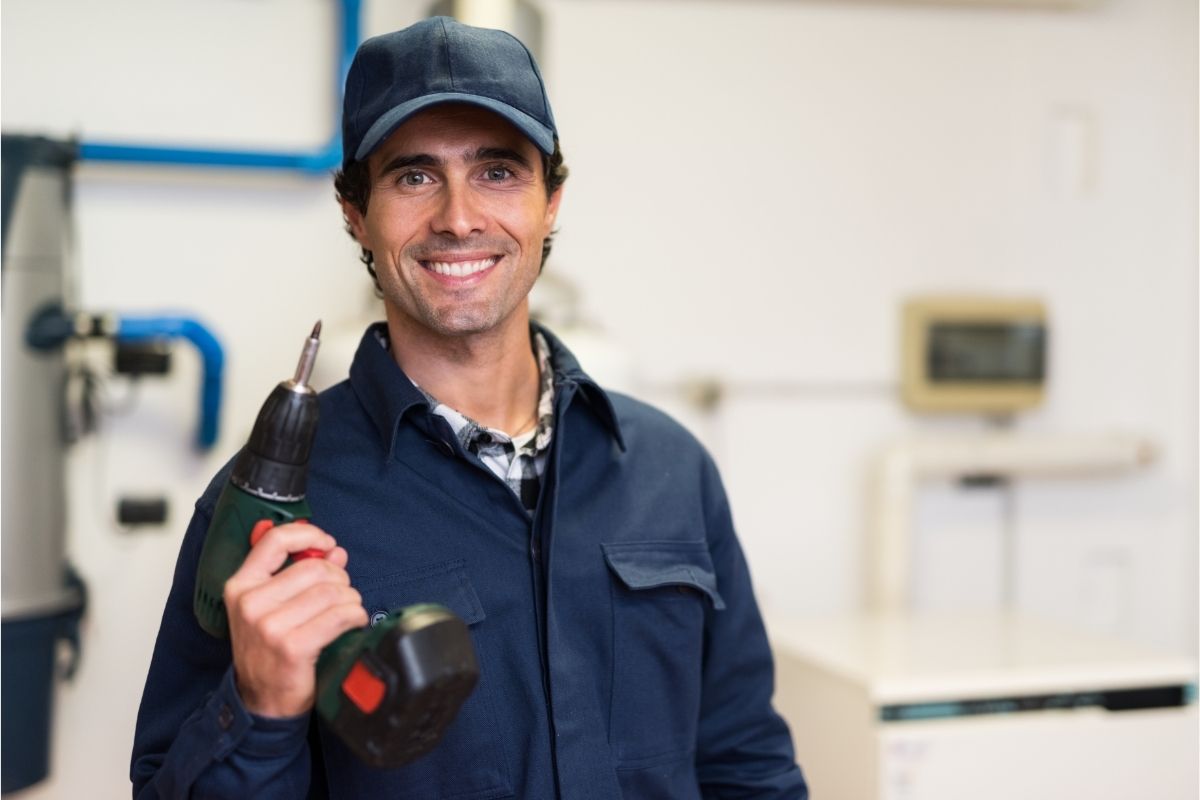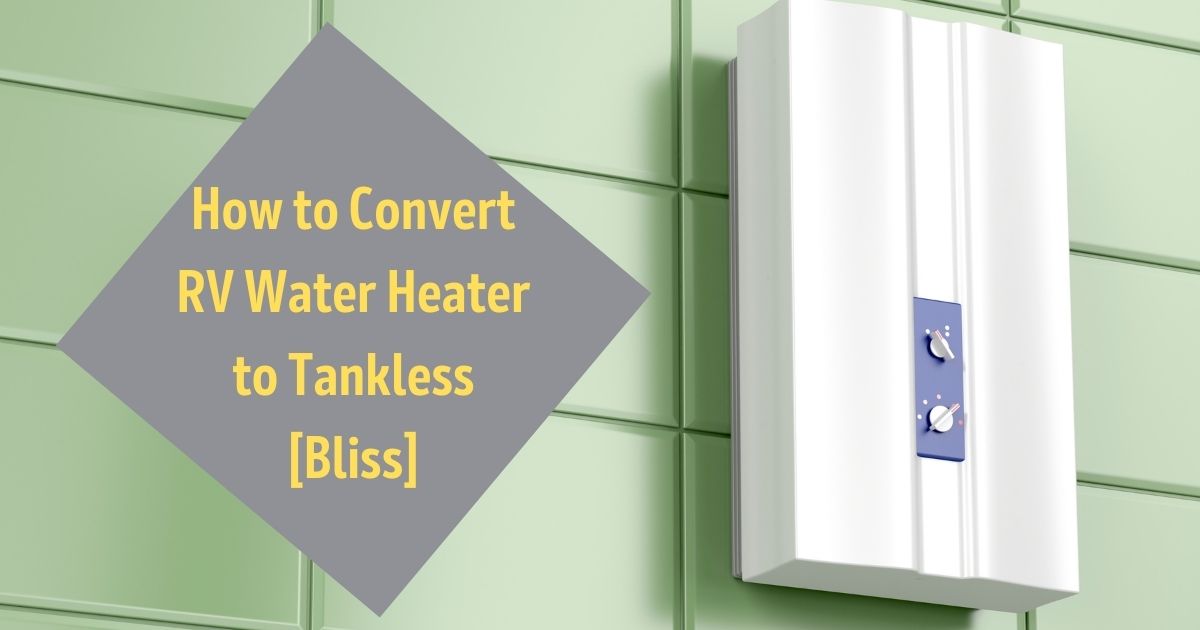What is a Tankless Water Heater?
Let’s have a look at how to convert your RV water heater to tankless. When camping or living in your RV, you often wish for a long, hot shower after a day of hiking, but the small water tanks in an RV usually mean the hot water runs out halfway through your shower.
If you want a long-term solution to this problem, you need to purchase and install a tankless water heater. This allows for unlimited hot water on demand and doesn’t use up propane, heating a whole tank of water that may not be used.

The Pros and Cons of an On-Demand RV Water Heater (Tankless)
Having on-demand, unlimited hot water in your RV may seem like a dream, and there certainly are many pros to having a tankless water heater. However, there are some downsides to installing this system as well.
Pros
- Unlimited hot water at full-service campgrounds: This is the main reason many people switch to a tankless water heater, especially those with large families or those who live in their RV.
- On-demand hot water: This means that you do not have to wait for a tank to be heated up or wait a long time between showers for a full tank to heat up again. The water will come out hot when needed, and you do not need to heat an entire tank of water at a time–just the water you need.
- Lighter than water tank heater: The weight difference between the two will be noticed when driving your RV.
- Pre-set temperatures: The water temperature can be preset before your shower, so you know the water will be at a comfortable temperature.
Cons
- Wastes water: There will be a three to five-second delay in getting hot water when you turn on the tap. This can be a major setback for those who need to conserve water, as every time you need to turn on the tap, you will need to let your water run for several seconds.
- Uses more propane: Because this will use propane and you will be tempted to have longer showers due to the unlimited water, this may not be ideal for those concerned with the costs of using too much propane.
- They can freeze in cold temperatures: Ensure you buy a system with freeze protection if you are in freezing temperatures.
- Less efficient in high elevations and low temperatures: This may be a problem for those camping/living in the mountains, especially during winter.
- The upfront cost is more expensive: The general cost of a tankless water heater is more upfront.
How to Convert Your RV Water Heater to Tankless
Converting your RV water heater to tankless is quite simple and painless. Once you find the perfect tankless heater and purchase it, simply follow these steps for unlimited hot water in no time!
- It is imperative to turn off the water pressure pump, electricity, and propane first.
- Open the pressure relief valve and drain valve to drain the hot water tank of all water.
- Disconnect the lines (gas, cold and hot water lines) from the old water heater and the electric connections. A good idea is to take photos of the connections to know where to reconnect.
- Remove the old unit and unscrew it completely.
- Remove and scrape off the old caulking and clean leftover residue.
- Around the opening of the exterior compartment, place butyl tape.
- Fit the new tankless heater and screw on the new door.
- Add lap sealant around the unit.
- Reconnect the water and gas lines. If the lines do not fit, you can use PEX tubing to make the connections as needed. You do not require a water heater bypass valve in a tankless system.
- Install the heater control panel somewhere on the inside of the RV close to the shower.
- Reconnect the electrical connections.
- Turn on the water pump and gas lines to check for leaks.
- Turn on the power and enjoy the hot water!
Maintenance Tips For Your Tankless Water Heater
Tankless water heaters are a safe and low-maintenance option compared to a typical water heater. In addition, they have a longer lifespan than traditional water heaters and do not have a high tendency for leakages.
The maintenance for each tankless water heater will vary, and you should consult the instruction manual or hire a professional to perform routine maintenance. To complete regular maintenance, you will have to know how to access the tankless water heater.
Do not begin any maintenance without disconnecting the lines and power sources. Ensure that you have allowed the heater to cool down before you start tampering with it.
Do You Need a Plumber for Tankless Conversion?
If you have read our steps and think converting your hot water system to a tankless system is out of your skillset, or you simply do not have the time, you can always hire a professional plumber to install the tankless unit.
While it is a reasonably straightforward process to do yourself, it is always best to consult a professional for assistance if you do not feel comfortable installing it by yourself.
Choosing a Suitable Tankless Heater for Your RV
Brand
A tankless heater does not need to be the same brand currently in your RV; it just needs to be a suitable size to fit into the RV. The best brands on the market today include Suburban, Atwood, and Girard. All of these brands are retrofit which means they should be compatible with most campers.
Size
The size of the tankless system should fit into the same place as the current water heater unit. Take measurements of your old system to check if the new system will work. You will need to measure and purchase a new door as they are sold separately.
Flow Rate (GPM)
The flow rate is measured in gallons per minute (GPM). The tankless water heater measures the flow rate input, and the burner ignites once the minimum level is reached. However, sometimes tankless water heaters have too low of a flow rate to ignite the burner.
To increase the flow rate of your tankless water heater, you can try the following; bleed all the air from the water lines, only use one water fixture at a time, and remove water flow restrictors in your plumbing.
BTU
The British Thermal Unit (BTU) measures power consumption to each gas appliance. A water heater with a high BTU rating will usually heat water quicker or warm water to a hotter temperature.
Water Pressure (PSI)
The water pressure is measured in PSI (pounds per square inch), and water heaters require a minimum pressure to trigger the ignition. However, in tankless heaters, the flow rate is more important than the PSI.
Electric vs. Propane
When purchasing a tankless water heater, you will have the option of an electric or propane-fueled system. Electric units are the more common style and are generally cheaper to run, and are environmentally friendly as they don’t require fossil fuel to power them.
The downside for some is that they require a reliable electrical source, so you may prefer a propane unit if you are doing a lot of off-grid camping. Propane units can be used like any gas appliance; however, they cost more to operate and are not as environmentally friendly.
Which Tools are Required to Convert your RV Water Heater to Tankless?
When converting your RV water heater to tankless, you will require only a few essential tools, including the following:
- Screws
- Screwdrivers or an electric drill
- Lap sealant
- Butyl tape
- PEX tubing
- Cleaning equipment & tools for scraping old caulk away

The Differences Between Tank and Tankless Water Heaters
A regular tank water heater will have a tank filled with water and heat that entire tank of water when it is turned on. A tankless water heater will heat the water as it flows through the unit and come out as hot water (although there is a wait time of three to five seconds).
For those with large families or who want to take multiple showers throughout the day, a regular tank water heater is very inconvenient as you have to turn on the tank heater and wait for the entire water tank to be heated before use. Then, once the water in the tank runs out, you need to repeat the process.
A tankless water heater will only heat the amount of water you use when you turn on the faucet, meaning you can have unlimited hot water at any point in the day. This saves energy and money in the long run. However, the tankless water heater will cost more upfront to purchase.
You will also end up wasting more water with a tankless heater as you have to wait for the water to become warm for a few seconds every time you use the faucet or shower. This doesn’t sound like a long time, but if you have limited access to fresh water and you have to wait for five seconds every time you use a faucet, it can add up.
FAQs on Tankless Water Heaters
Why is the water colder than the temperature stated on the control panel?
The water coming out of the output valve of the heater will be the temperature set on the control panel, so as it runs through the RV plumbing, the water will get slightly cooler when it runs out of the faucet.
The further away the fixture from the heater, the colder the water will be. The temperature change may vary by a few degrees, and you will learn to adjust the water temperature according to this.
How long does a tankless water heater last compared to a tank heater?
A tankless water heater can last up to 20 years with the appropriate conditions and maintenance. A regular tank water heater can last up to 10-12 years and is often more expensive to repair if there is any damage or parts that need replacing (you may have to replace the entire unit).
A tankless water heater is easier and cheaper to repair and find replacement parts.
Is a tankless water heater suitable for all types of camping/RV living?
The tankless water heater is not suitable for those frequently camping in high altitude temperatures, as it does not perform as efficiently. It also may not be ideal for those camping in frigid temperatures as it can freeze.
If you plan on a lot of cold weather camping, you may consider purchasing a model with freeze protection.

Conclusion
It is crucial to do your due diligence on whether a tankless water heater is suitable for your lifestyle, budget, and living conditions. You will also need to research the perfect model and style of tankless water heater unit for your camper.
Once you choose your tankless unit, just follow our simple guide to remove your old unit and assemble the new model. You will be enjoying the freedom of uninterrupted hot showers in no time!
